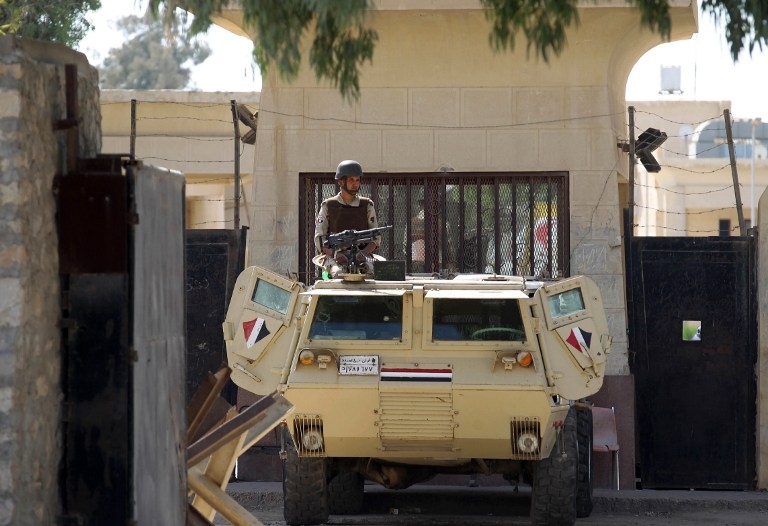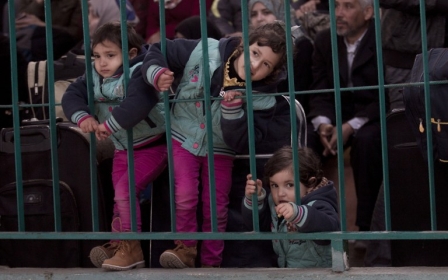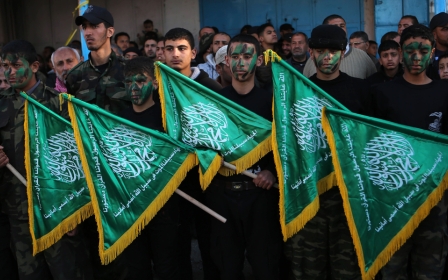Hamas presses Egypt over Rafah crossing in rare Cairo talks

GAZA CITY - A surprise visit by senior Hamas leaders to Cairo has raised hopes in Gaza of a rapprochement between Egypt and the blockaded Palestinian territory’s de facto authorities that could pave the way for the Rafah border crossing to be opened on a regular basis.
Hamas has been at odds with the current Egyptian government of Abdel Fattah al-Sisi since the 2013 coup in which elected president Mohamed Morsi was overthrown and the Hamas-allied Muslim Brotherhood was outlawed, with hundreds of its members including Morsi sentenced to death.
The delegation's arrival in Cairo on Saturday also came just days after Egypt’s Interior Minister Magdy Abdel Ghaffar accused Hamas of involvement in the planning of a bomb attack in Cairo last June in which the country’s top prosecutor Hisham Barak was killed.
Ghaffar said that Hamas had trained several Egyptian Brotherhood members to carry out the attack, prompting Hamas to respond that the allegation was “baseless”.
According to the Palestinian Maan news agency, plans for Hamas's Qatar-based leader Khaled Meshaal to join the delegation and hold talks with Egyptian security chief Khalid Fawzi were swiftly postponed because of the row.
But more recent comments by senior Egyptian and Hamas officials have suggested a more conciliatory tone on both sides.
Writing on Twitter on Tuesday evening, Khalil Al-Hayya, a member of the delegation, said that talks with Egyptian intelligence officials had been “responsible and transparent”.
He said that Hamas condemned all assassinations in Egypt and denied that the group had ever interfered in Egyptian affairs.
In a letter published in the Hamas-aligned Al Resalah newspaper to coincide with the talks, Mahmoud Fahmy, Egypt’s first ambassador to the Palestinian Authority, said he believed Hamas had no evil intentions towards Egypt.
“My conviction towards Hamas will never change as the Hamas I knew would only do what is good for us,” he said.
The visit by Hamas officials has also fuelled rumour and hope in Gaza that Egypt could be poised to re-open the Rafah crossing, the only non-Israeli-controlled entry point and a vital lifeline for the besieged enclave where 70 percent of the population rely on humanitarian aid.
“Egypt is the only one with the power to open the border crossing” Ayyad, a 26-year-old cigarette vendor in Rafah, told MEE.
“They are the ones with the key to the gate that can change life here for the better.”
Egypt last year opened the crossing on just 21 days, according to Hamas’ interior ministry figures, allowing a few thousand people to move both ways, as well as flooding and demolishing many of the border tunnels that were used to smuggle people and goods in and out.
Yet before Egypt’s coup in mid-2013, up to 40,000 people had been able to come and go each month, according to Gisha, an Israeli human rights group.
“In emphasising the historical role of Egypt towards the Palestinian people, we ask our brothers in Egypt to alleviate the suffering in Gaza Strip and to begin by opening the Rafah border crossing,” Hayya said on Tuesday.
But analysts in Gaza told MEE that they remained sceptical that the talks in Cairo would reap immediate results – and that several days of silence on both sides did not indicate that discussions had been straightforward.
“The meeting is more of an exploration [of views] following all the accusations made by Cairo,” said Gaza-based analyst Akram Atallah, adding that Egypt was seen as having an important role to play in reconciling Hamas, which has ruled Gaza since 2007, with the West Bank-based Palestinian Authority.
Ismail Radwan, Hamas's leader in Gaza, also said that the talks were ongoing and serious.
“We are keen on the continuation of the relationship between Hamas and Egypt,” he said, describing the visit as “a step towards achieving positive results”.
Radwan said that the opening of the Rafah crossing could bring economic benefits for Gaza and Egypt of between three and seven billion dollars.
“Egypt has a priority to get these profits,” he added.
Reports of reconciliation between Hamas and Egyptian intelligence officials have also raised fears among hardline groups in Gaza that they could be targets for a renewed crackdown.
Hamas security officials reportedly moved to arrest Wael Hassanin, an influential Salafist preacher, and members of his entourage within hours of the meeting in Cairo, according to the Ibn Taymiyyah Media Center, which is aligned with the Mujahideen Shura Council (MSC) in the environs of Jerusalem, a Salafist militant group.
During Morsi’s presidency, the MSC, which operates in both Gaza and the Sinai, accused Hamas of allowing Egyptian intelligence agents to enter Gaza and interrogate its members arrested there following rocket attacks on the Israeli town of Eilat.
Ahmed Yousef, a senior Hamas leader, said that the delegation also planned to visit regional capitals in Qatar, Saudi Arabia, Iran, Turkey and Lebanon before returning to Gaza.
New MEE newsletter: Jerusalem Dispatch
Sign up to get the latest insights and analysis on Israel-Palestine, alongside Turkey Unpacked and other MEE newsletters
Middle East Eye delivers independent and unrivalled coverage and analysis of the Middle East, North Africa and beyond. To learn more about republishing this content and the associated fees, please fill out this form. More about MEE can be found here.




